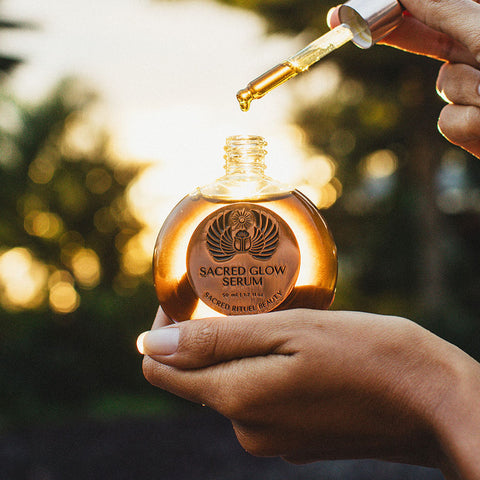
Ingredient Page: Sunflower Seed Oil
As one of the most potent ingredients in the Sacred Serum face oil, sunflower surely has the looks and energy of pure sunshine and positive things. It’s like a burst of radiance and vitality in every drop of the Serum.
Sunflower is often associated with Greek mythology involving Clytia, a water nymph, and Helios, the god of sun. Moreover, there are 70 different sunflower species, all native to North and Central America.
With all the natural oils rising to fame, sunflower seed oil is still considered as a staple ingredient in most personal care products.
So, let's not waste any time and dive straight into the fascinating world of sunflower seed oil. We'll explore its history and answer two important questions: How is it made, and why is it important?
|
Type: Sunflower Seed Oil is extracted from the flower’s edible seeds. The most commonly used sunflower species is the Helianthus annus which is native to North and Central America. History: Spanish explorers brought the exotic North American plant back to Europe around 1500. It became very popular as a cultivated plant in the 18th century and was initially used as an ornamental. Later, the commercial manufacturing of sunflower oil began in 1830. Benefits: Hydrates skin, supports the skin’s natural moisture barrier, heals wounds, soothes and softens skin A Sacred Secret? The oil derived from sunflower is considered as non-comedogenic, meaning it is highly absorbent and doesn’t clog pores. Sunflowers are a great ball of sunshine, but not all sunflowers are yellow. They can also be red or purple and vary in height, with some reaching up to 10 feet! |
Background: Sunflower Seed Oil
Sunflower seed oil is a versatile vegetable oil, an excellent source of essential fatty acids, it’s rich in vitamins A, D, and K, and has high levels of vitamin E.
These essential fatty acids found in sunflower seed oil include linoleic acid (omega-6) and oleic acid (omega-9), which play a significant role in maintaining healthy skin, hair, nails, and overall well-being. Additionally, vitamins A, D, and K help the skin look youthful and vibrant. Lastly, vitamin E, an antioxidant, aids in protecting the skin from the damaging effects of free radicals.
Now, let's answer the question: How is sunflower seed oil made? Traditionally, the oil was obtained by cold-pressing the sunflower seeds. Nowadays, the oil is commonly produced using a process called solvent extraction, which is not only faster but also more efficient.
Sunflower seed oil can be used in a variety of ways. It is a great choice for cooking and baking and can be used in salads, sauces, and dressings. Beauty enthusiasts also include sunflower oil in their daily skincare routine as it cleanses and moisturizes your face, leaving you refreshed and more confident.
The best thing about sunflower oil is that it is gentle and non-irritating, making it suitable for all skin types, including sensitive skin!
Benefits Include:
- Nourish and protect the skin
- Keep the skin hydrated
- Reduce inflammation, and
- Fight damaging effects of free radicals
- Help reduce the appearance of blemishes
- Strengthen the skin’s natural barrier
Sacred Serum & Sunflower Seed Oil
Sacred Serum face oil adapts to your skin type due to a balanced formula of botanical superfood flowers, plant and seed oils. Working synergistically with the 26 other organic ingredients in the Sacred Serum face oil, sunflower seed oil possesses more vitamin E than any organic vegetable oil out there and it goes deep into the skin to feed, protect and beautify.
Our organic nutrients and antioxidants penetrate to provide a healthy glow while balancing your skin tone.
Sacred Serum Benefits:
- Deeply moisturizes for an instant visible glow
- Reduces inflammation and promotes cell regeneration for a visibly youthful glow in a matter of days.
- Amplified by 777 mg USA-certified organic full-spectrum Hemp extract
- Has a light texture that quickly absorbs into the skin for an instant smoothing, soothing glow
- Protects from environmental damage with powerful antioxidants, fatty acids and vitamins A, B, C, D, E
- Unbelievably smoother, brighter skin, visibly transformed in a few days
Why Choose Organic Sunflower Seed Oil?
Organic ingredients have more potent nutrients and are free from chemicals and pesticides that enter your body. The key to beautiful skin lies in vitamins and nutrients, so we only choose to source the finest ingredients without chemicals and pesticides.
- Organic (Biodynamic) Label: Refers to how ingredients are grown and harvested. According to the U.S. Department of Agriculture, produce can be called organic if it is certified to have been grown on soil that hasn't been treated with synthetic fertilizers or pesticides for at least 3 years.
All Sacred Rituel ingredients are made without:
- Artificial Colors & Dyes
- Preservatives, Parabens, Phthalates
Preservatives: May be used in cosmetics to prevent the growth of harmful bacteria and mold. Parabens and formaldehyde-releasing preservatives are commonly used preservatives in cosmetic and personal care products.
Parabens: Are preservatives used in a wide variety of personal care products and foods to prevent the growth of microbes. These endocrine-disrupting chemicals can be absorbed through skin, blood and the digestive system.[1]
Phthalates: Pronounced THAL-ates, these chemicals, which are linked to endocrine disruption, developmental and reproductive toxicity, and cancer, have been banned from cosmetics in the European Union, but still remain prevalent in U.S. products.
Methylisothiazolinone (MIT) & Methylchloroisothiazolinone (CMIT): They may be hard to pronounce, but they can be even harder on the body. These common preservatives are found in many liquid personal care products and have been linked to lung toxicity,[1] allergic reactions, and possible neurotoxicity.
- Synthetic Fragrance
- Fillers, Stabilizers, & Binders
- Nanomaterial & Nanoparticles
- Retinol & Retinol Compounds

Sacred Secrets: All Things Sunflower Seed Oil
What is sunflower seed oil?
Sunflower seed oil is a popular type of vegetable oil well known for its nourishing elements. It is packed with essential fatty acids, vitamins, and antioxidants that help maintain skin’s natural and youthful glow. Sunflower seed oil reduces inflammation and improves the skin's moisture barrier while keeping it hydrated.
Sunflower seed oil comes in a variety of types, each with its own unique set of characteristics and benefits. The most common types are cold-pressed, high oleic, and refined.
- Cold-pressed sunflower seed oil is made by pressing the oil from the sunflower seed without using any heat or chemicals. This type of oil is typically unrefined and retains its natural flavor and color. It is also rich in vitamins and minerals, making it a great choice for cooking.
- High oleic sunflower seed oil is made from sunflower seeds bred to contain higher levels of oleic acid. This type of oil is more stable than regular sunflower seed oil and has a higher smoke point, making it ideal for high-heat cooking.
- Refined sunflower seed oil is made by refining the oil from the sunflower seed. This type of oil is often bleached and deodorized to remove any impurities and to give it a longer shelf life. It is also higher in saturated fat than other types of sunflower seed oil, making it less suitable for cooking.
Each type of sunflower seed oil has its own unique set of benefits and drawbacks, so it is important to choose the one that best suits your needs.
- Cold-pressed sunflower seed oil is the most nutritious and flavorful
- High-oleic sunflower seed oil is the most stable and suitable for high-heat cooking
- Refined sunflower seed oil is the least nutritious but has the longest shelf life
How is sunflower oil made?
Sunflower oil is extracted from the sunflower plant, Helianthus annus, native to North and Central America. Here are the steps involved in making sunflower seed oil:
- Harvesting of the sunflower seeds: Sunflower seeds are harvested from the sunflower plant, which is a tall, yellow-flowering plant native to North America.
- Drying the seeds: The seeds are then dried in a well-ventilated environment for a few days.
- Cold-pressing the seeds: To extract the oil from the seeds, a process called cold-pressing is done and helps retain the natural vitamins and minerals in the oil, making it a healthier choice.
- Refine and filter the oil: Once the oil is extracted, it is then refined and filtered to remove any impurities. The refining process involves heating the oil and treating it with chemicals to remove any contaminants.
- Store the oil: The filtered oil is then stored in a clean, dark, airtight container to preserve its quality and freshness.
Where does sunflower seed oil come from?
Sunflower seed oil comes from the seeds of the sunflower plant, which is native to North and Central America. The oil is extracted from the seeds either through cold pressing or through the use of chemical solvents.
Sunflower seed oil is produced in many countries around the world, with the largest producers being Russia, Ukraine, Argentina, and the United States.
What does sunflower seed oil smell like?
Sunflower seed oil has a mild and neutral aroma. It doesn't have a strong or distinct scent like some other oils and is often described as bland.
What does sunflower seed oil feel like?
Sunflower seed oil has a light and smooth texture. It provides a gentle and moisturizing sensation without leaving behind a heavy residue. Sunflower seed oil is often praised for its ability to leave the skin feeling soft, nourished, and hydrated.
Is sunflower oil good for all skin types?
Sunflower oil is suitable for all skin types, including sensitive skin. It is gentle, lightweight, and non-comedogenic, so it won't clog pores.






